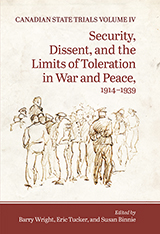The fourth volume in the Canadian State Trials series, entitled “Security, Dissent, and the Limits of Toleration in War and Peace: 1914-1939”, examines the legal issues surrounding perceived security threats and the repression of dissent from the outset of World War One through the Great Depression. War prompted the development of new government powers and raised questions about citizenship and Canadian identity, while the ensuing interwar years brought serious economic challenges and unprecedented tensions between labour and capital.
The chapters in this edited collection, written by leading scholars in numerous fields, examine the treatment of enemy aliens, conscription and courts martial, sedition prosecutions during the war and after the Winnipeg General Strike, and the application of Criminal Code and Immigration Act laws to Communist Party leaders, On to Ottawa Trekkers, and minority groups. These historical events shed light on contemporary dilemmas: What are the limits of dissent in war, emergencies, and economic crisis? What limits should be placed on government responses to real and perceived challenges to its authority?
Professor J. Barry Wright is cross-appointed in History from the Department of Law at Carleton University.
See more at University of Toronto Press
